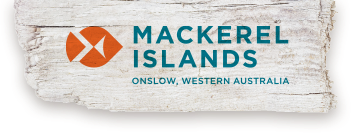Mackerel Islands Nature & Wildlife Calendar
There are amazing natural encounters all year round, however during certain times these experiences are at their most intense. We have listed a few of the key ones our guests enjoyed most over the past 12 months to help you in your planning.
From marine encounters with whales, dolphins and dugongs, to land based interactions with nesting turtles, migratory birds and residential ospreys, a holiday on the Mackerel Islands offers a highly personal nature experience.
January | February | March | April | May | June |
|---|---|---|---|---|---|
| Turtle hatching | Turtle hatching | Turtle hatching | School Holiday Activities | White-bellied sea eagle & osprey nesting | White-bellied sea eagle & osprey nesting |
| Bridled terns | Bridled terns | Bridled terns | Peak fishing month and Coral spawning | Eta Aquariids (meteor shower) | Caspian and Crested terns nesting |
| Storm watching | Storm watching | Coral Spawning | Bridled terns | Peak Fishing Month | Fairy terns and Wedge-tailed shearwaters arrive |
July | August | September | October | November | December |
| Humpback whales | Humpback whales | Humpback whales | Turtle nesting | Turtle nesting | Turtle nesting |
| White-bellied sea eagle & osprey nesting | White-bellied sea eagle & osprey nesting | Big spring tides from the Supermoon | Big spring tides from the Supermoon | Bridled terns | Bridled terns |
| Delta Aquariids and Alpha Capricornids (meteor shower) | Peak fishing month | Wildflowers | School Holiday Activities | Coral trout active | Storm watching |
| School Holiday Activities | Wildflowers | School Holiday Activities | Turtle mating | Bridled, Fairy and Caspian terns nesting | Wedge-tailed shearwater, beach-stone curlew and bridled terns nesting |
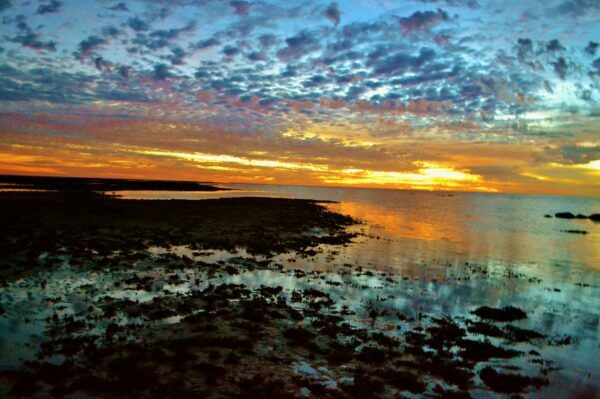
January
Summer storm build up continues to be seen over the mainland, which keeps the island bird life excited. The new year brings the excitement of baby turtles beginning to hatch!
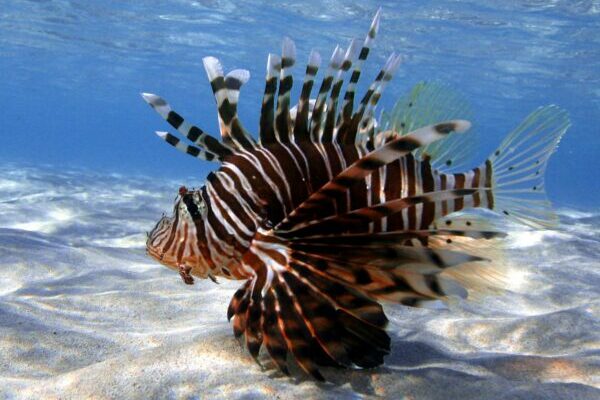
February
February brings with it more turtle hatchlings, and the continued storm activity keeps the wildlife both in and out of the water active!
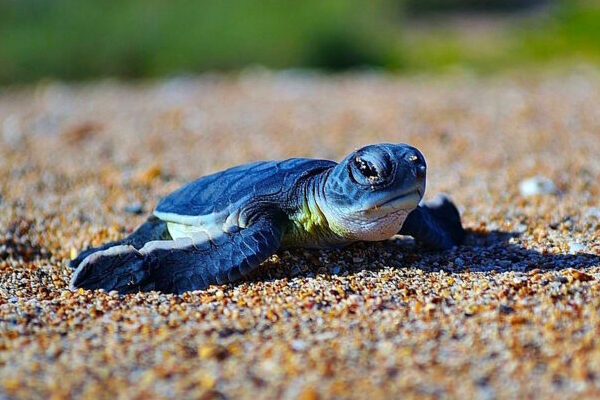
March
March is the best time for the potential of seeing coral spawning and you don't want to miss the last of the baby turtles. Breathtaking storm build up can still be seen over the mainland from our beachfront cabins.
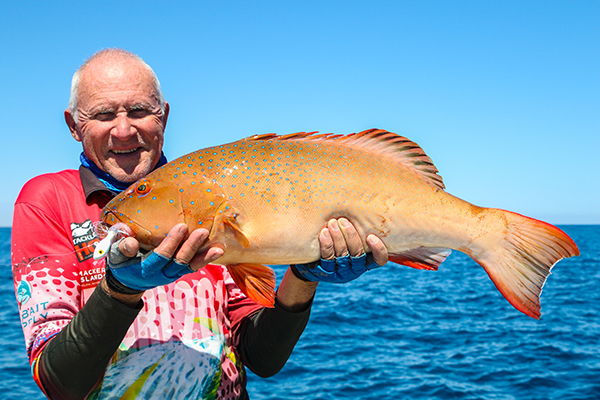
April
Not only is the island busy with wildlife in April but our school holiday activities will be kicking off from 26th of March to the 14th of April 2024. This month offers some of the best fishing and the ocean is full of life as the colorful coral is spawning.
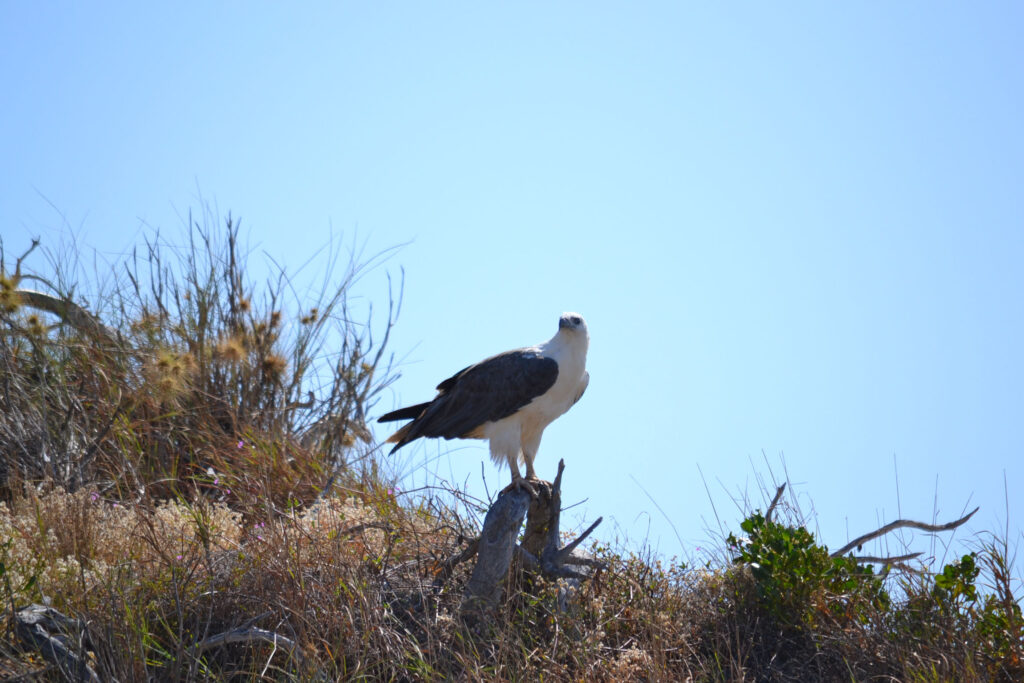
May
May marks the start of the white-bellied sea eagle nesting season. With the Eta Aquariids meteor shower making an appearance and more great fishing, May is a magical time to visit.
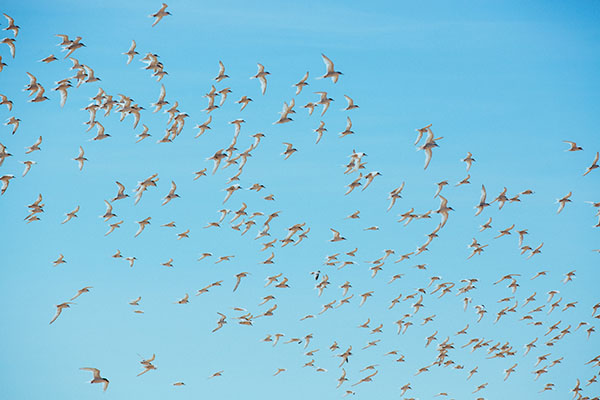
June
June is filled with lots of exciting bird activity. From the arrival of fairy terns and wedge-tailed shearwaters to the nesting of the caspian and crested terns. The eastern osprey begins nesting and white-bellied sea eagle continue with their nesting season too, and you’ll likely see them around the island collecting sticks or out catching fish.
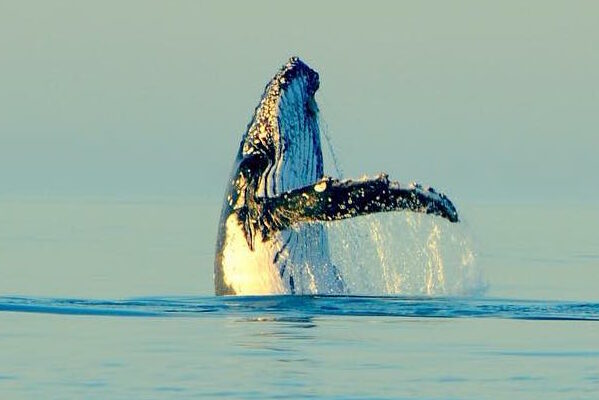
July
The magnificent humpback whales can be seen as they migrate north to breed and calve. The colorful wildflower season begins, and more birds visit the island including the critically endangered eastern curlew. From meteor showers and our wide range of school holiday activities there is lots to see and do during the month of July!
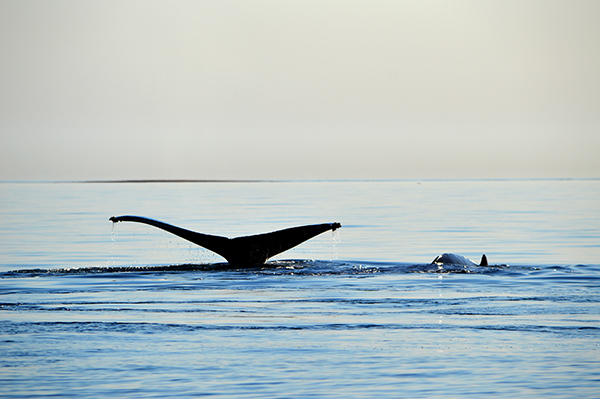
August
More migratory birds continue to flock to the island, including 3 critically endangered species, and the majestic humpback whales continue to show off. The first supermoon of the year means impressive tides for reef walking and sensational fishing.
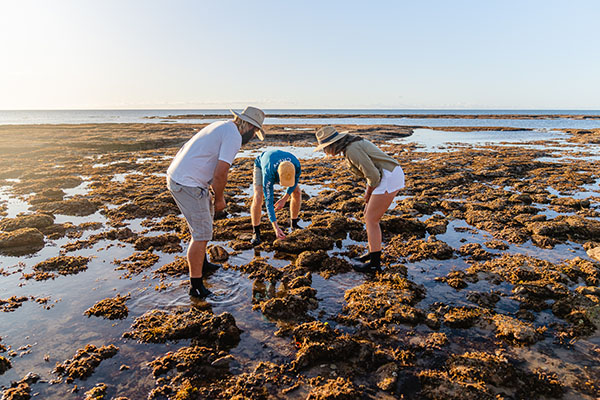
September
The last of the humpback whales pop in to say hello with their cute new calves as they make their journey back south. Another spectacular supermoon lights up the sky as the turtles begin their mating season. The fishing continues to be outstanding with the biggest tides of the year this month.
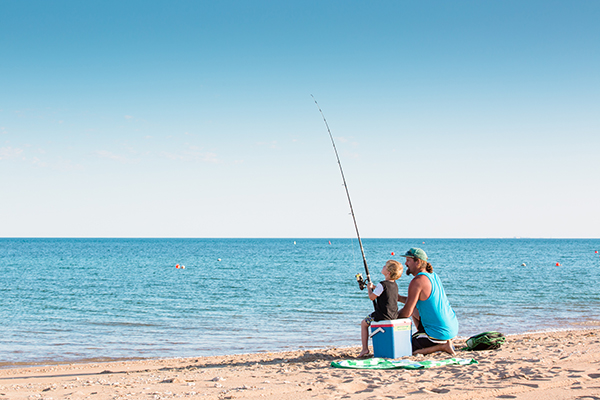
October
October brings the last supermoon of the year, creating the perfect night light to watch the beginning of turtle nesting season! The last of the school holiday activities come at the perfect time with more impressive tides which are great for reef walks and exploring the rock pools.
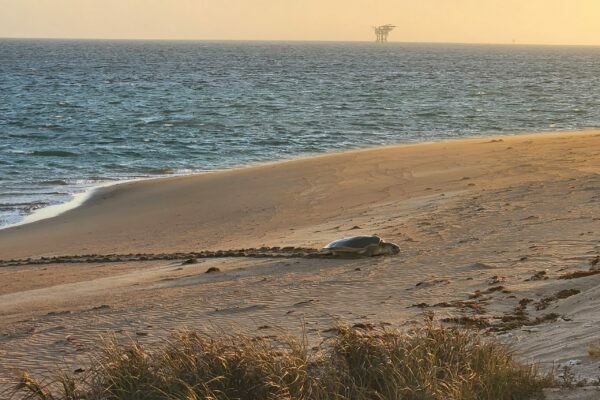
November
The turtles continue nesting in November, so it's a great time to spot them laying eggs on the beach. The bridled terns can also be seen as they are amid their breeding season, keep an eye out for them doing their love dance!
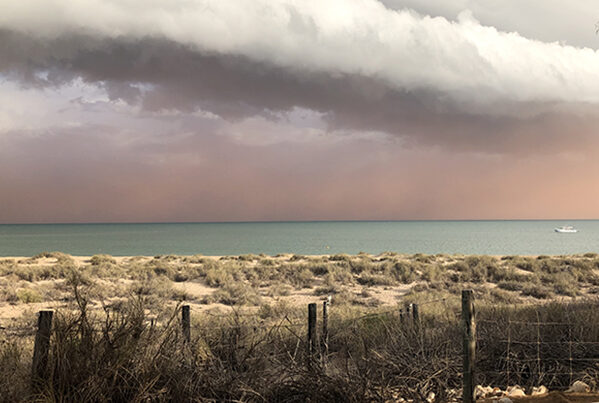
December
The last of the turtles finish nesting as the year ends, and the season for watching beautiful summer storms begins.
April
School Holiday Activities
A range of extra activities are available during the school holidays, beginning on the 26th of March and ending on the 14th of April. The activities range from guided snorkels, low tide reef walks, sunset boat cruises, kids fishing clinics and more! This is a great time for families to visit!
*Available during school holidays only and may be substituted. Subject to weather and tide conditions.
Coral Spawning
Coral spawning is an extraordinary natural phenomenon that usually occurs in March and April when the conditions are just right. Not only is coral spawning important for replenishing the reef but it also provides important food for other island wildlife.
Fishing
April is known to be one of the best fishing months around the Mackerel Islands. Whether you are boat fishing or land fishing there is plenty biting! Check out the list below for some of the favourite catches off Thevenard Island:
- Spanish Mackerel
- Red Emperor
- Sailfish
- Coral Trout
- Rankin Cod
- Snapper
- Wahoo
- Bluebone
- Golden Trevally
- Giant Trevally
- Queenfish
- Threadfin Salmon
- Mangrove Jack
- Spanish Flag
For more information on fishing the Mackerel Islands you can visit our fishing page.
*Please ensure you are aware of and following DPIRD fishing regulations.
Bridled Terns
These beautiful black and white terns migrate to Western Australia all the way from Indonesia and can be seen around the Mackerel Islands from September to April. The bridled terns come to breed and nest every year in the Pilbara region, after their young have hatched, you’ll often see the adults holding “flight school” for the young juveniles.
May
White-bellied Sea Eagle
The white-bellied sea eagle is the second largest raptor in Australia, with a wingspan of up to 2.2 meters! Keep an eye out for these birds as they begin their nesting season in May. They love hunting for fish around the island, which is an impressive sight to see!
Eta Aquariids Meteor Shower
The Eta Aquariids meteor shower will be visible this month, with the best viewing times being the 7th and 8th of May around 5.00am. This meteor shower is known to be visible over longer periods of time, with the potential for 30 meteors per hour!
Fishing
The fishing in May continues to be outstanding. Whether you are boat fishing or land fishing there is plenty biting! Check out the list below for some of the favourite catches off Thevenard Island:
- Spanish Mackerel
- Red Emperor
- Sailfish
- Coral Trout
- Rankin Cod
- Snapper
- Wahoo
- Bluebone
- Golden Trevally
- Giant Trevally
- Queenfish
- Threadfin Salmon
- Mangrove Jack
- Spanish Flag
For more information on fishing the Mackerel Islands you can visit our fishing page.
*Please ensure you are aware of and following DPIRD fishing regulations.
June
Eastern Osprey
Although the Eastern Osprey can be seen all year around on the island, June is when they start their breeding and nesting season. These romantic birds of prey mate for life and return to the same nest season after season. With more than 10 osprey nests scattered across the island you’ll see these pairs preparing their nests this month.
White-bellied Sea Eagle
The white-bellied sea eagle is the second largest raptor in Australia, with a wingspan of up to 2.2 meters! Keep an eye out for these birds as they continue their nesting season in June. They love hunting for fish around the island, which is an impressive sight to see!
Caspian and Crested Terns
The Caspian and Crested tern can be seen around the Mackerel Islands all year round however, this time of year they can be seen breeding and nesting.
Fairy Terns
Fairy terns are listed as a vulnerable species however we are lucky enough to have them breed across various Pilbara islands during the winter months. Meaning in the month of June you will begin seeing more of these special birds, they can be tricky to spot at first being the smallest sea bird in Western Australia!
Wedge-tailed Shearwater (Muttonbird)
More than 1 million wedge-tailed shearwaters migrate to the Pilbara islands every year, they begin to arrive in June. These birds are very impressive hunters, seeing them catch fish, crustaceans and insects is quiet the site!
July
School Holiday Activities
A range of extra activities are available during the school holidays, beginning on the 29th of June and ending on the 14th of July. The activities range from guided snorkels, low tide reef walks, sunset boat cruises, kids fishing clinics and more! This is a great time for families to visit!
*Available during school holidays only and may be substituted. Subject to weather and tide conditions.
Humpback Whales
The magnificent humpback whales start visiting as they migrate north to breed and calve. Island guests often see the whales daily during the month of July and are often lucky enough to see them breaching or tail slapping.Eastern Osprey
Although the Eastern Osprey can be seen all year around on the island, June is when they start their breeding and nesting season. These romantic birds of prey mate for life and return to the same nest season after season. With more than 10 osprey nests scattered across the island you’ll see these pairs all around the island preparing their nests this month.White-bellied Sea Eagle
The white-bellied sea eagle is the second largest raptor in Australia, with a wingspan of up to 2.2 meters! Keep an eye out for these birds as they continue their nesting season in July. They love hunting for fish around the island, which is an impressive sight to see!Delta Aquariids & Alpha Capricornids Meteor Showers
The Delta Aquariids and Alpha Capricornids meteor showers will be visible this month, with the best viewing times for both being the 29th to the 30th of July around 12.00am and 2.00am. With the potential for 34 meteors per hour between the two showers!Wildflowers
In July the island starts to become even more colourful as the wildflowers begin to bloom. This includes kapok bush, pigface, bayhops morning glory and water wattles just to name a few!Eastern Curlew
The critically endangered Eastern curlew start to arrive at the Mackerel islands this month, migrating all the way from Russia and China! These incredible birds have long curved bills that are perfect for finding food under sand and mud, like crustaceans, molluscs and insects.August
Humpback Whales
The magnificent humpback whales continue visiting as they migrate north to breed and calve. Island guests often see the whales daily during the month of August and are often lucky enough to see them breaching or tail slapping.
Supermoon
On the 20th of August there is the first Supermoon of 2024. This means the full moon is going to be even bigger than normal as it is closer to earth than usual.
Eastern Osprey
Although the Eastern Osprey can be seen all year around on the island, August is during their nesting season. This majestic bird of prey will have between 1 and 4 chicks every breeding season. With more than 10 osprey nests scattered across the island you’ll see these pairs all around the island caring for their newborns this month.
White-bellied Sea Eagle
The white-bellied sea eagle is the second largest raptor in Australia, with a wingspan of up to 2.2 meters! Keep an eye out for these birds as they continue their nesting season in August. They love hunting for fish around the island, which is an impressive sight to see!
Wildflowers
In August the island is filled with colour as wildflowers continue to bloom. This includes kapok bush, pigface, bayhops morning glory and water wattles just to name a few!
Spring Tides
The supermoon in August will mean that we start to see some very impressive tides around the new and full moon. The large spring tides mean at low tide you’ll be able to walk along the reefs and look for rock pools and wildlife, like crabs, starfish and octopuses. It also makes for great fishing!
Fishing
The fishing in August is incredible! Whether you are boat fishing or land fishing there is plenty biting! Check out the list below for some of the favourite catches off Thevenard Island:
- Spanish Mackerel
- Red Emperor
- Sailfish
- Coral Trout
- Rankin Cod
- Snapper
- Wahoo
- Bluebone
- Golden Trevally
- Giant Trevally
- Queenfish
- Threadfin Salmon
- Mangrove Jack
- Spanish Flag
For more information on fishing the Mackerel Islands you can visit our fishing page.
*Please ensure you are aware of and following DPIRD fishing regulations.
Curlew Sandpiper
The critically endangered curlew sandpiper migrates all the way from Russia, usually arriving in August and staying through till March. Their curved bill is made for searching through the sand to find worms, molluscs, crustaceans and insects.
Great Knot
The critically endangered great knot is another migratory bird that arrives in August, coming all the way from Russia and Siberia. These incredible birds have been known to fly up to 6,000 kilometers non-stop!
Bar-tailed Godwit
The bar-tailed Godwit holds the record for the longest non-stop flight of more than 11,000 kilometers! This critically endangered bird migrates to the Pilbara all the way from Northen Siberia, and August is the month they arrive!
September
School Holiday Activities
A range of extra activities are available during the school holidays, beginning on the 21st of September and ending on the 6th of October. The activities range from guided snorkels, low tide reef walks, sunset boat cruises, kids fishing clinics and more! This is a great time for families to visit!
*Available during school holidays only and may be substituted. Subject to weather and tide conditions.
Supermoon
On the 18th of September we will see the best Supermoon of 2024! This means the full moon is going to be at its biggest for the year, and at its closest proximity to the Earth. This will make for the perfect night light to watch for turtle and other wildlife!
Humpback Whales
The magic of the humpback whales continues in September as they start their journey back south again. You’ll see these gentle giants popping in with their cute new calves and guests will often see them breaching or tail slapping.
Turtles (Hawksbill, Flatback, Green and Loggerhead)
The turtles begin their mating season in September so there will plenty hanging around the islands reef systems. Island guests often see them swimming in the shallows or snorkelling around home reef just off the beach. Please ensure you follow DBCA’s Turtle Watching Code of Conduct while experiencing this magical time to ensure we continue to protect our turtles.
Bridled Terns
These beautiful black and white terns migrate to Western Australia all the way from Indonesia and can be seen around the Mackerel Islands from September to April. The bridled terns come to breed and nest every year in the Pilbara region, after their young have hatched you’ll often see the adults holding “flight school” for the young juveniles.
Spring Tides
The supermoon in September will mean that we see the biggest tides of the year around the new and full moon. The large spring tides mean at low tide you’ll be able to walk along the reefs and look for rock pools and wildlife, like crabs, starfish and octopuses. It also makes for great fishing!
Fishing
The fishing in August is incredible! Whether you are boat fishing or land fishing there is plenty biting! Check out the list below for some of the favourite catches off Thevenard Island:
- Spanish Mackerel
- Red Emperor
- Sailfish
- Coral Trout
- Rankin Cod
- Snapper
- Wahoo
- Bluebone
- Golden Trevally
- Giant Trevally
- Queenfish
- Threadfin Salmon
- Mangrove Jack
- Spanish Flag
For more information on fishing the Mackerel Islands you can visit our fishing page.
*Please ensure you are aware of and following DPIRD fishing regulations.
Wildflowers
In September the island is filled with colour as wildflowers continue to bloom. This includes kapok bush, pigface, bayhops morning glory and water wattles just to name a few!
October
School Holiday Activities
A range of extra activities are available during the school holidays, beginning on the 21st of September and ending on the 6th of October. The activities range from guided snorkels, low tide reef walks, sunset boat cruises, kids fishing clinics and more! This is a great time for families to visit!
*Available during school holidays only and may be substituted. Subject to weather and tide conditions.
Supermoon
The last supermoon of 2024 will be seen on the 17th of October. This means the full moon is going to be even bigger than normal as it is closer to earth than usual. This will once again provide an incredible night light for watching nesting turtles!
Turtles (Hawksbill, Flatback, Green and Loggerhead)
Turtle mating continues into October and it also brings the beginning of the turtles nesting season, this includes the hawksbill, flatback, green and loggerhead turtle. A walk along any beach on the island and you’ll spot their tracks into the dunes where they lay their eggs. Please ensure you follow DBCA’s Turtle Watching Code of Conduct while experiencing this magical time to ensure we continue to protect our turtles.
Spring Tides
The supermoon in October will mean that we start to see some very impressive tides around the new and full moon. The large spring tides mean at low tide you’ll be able to walk along the reefs and look for rock pools and wildlife, like crabs, starfish and octopuses. It also makes for great fishing!
Bridled Terns
These beautiful black and white terns migrate to Western Australia all the way from Indonesia and can be seen around the Mackerel Islands from September to April. The bridled terns come to breed and nest every year in the Pilbara region, after their young have hatched you’ll often see the adults holding “flight school” for the young juveniles.
November - March
Turtles (Hawksbill, Flatback, Green and Loggerhead)
Throughout November and December, the turtles are nesting on the island, this includes the hawksbill, flatback, green and loggerhead turtle. A walk along any beach on the island and you’ll spot their tracks into the dunes where they lay their eggs. Come January, February, and March the turtle eggs are hatching, keep an eye out for the very cute baby turtles!
Please ensure you follow Turtle Watching Code of Conduct while experiencing this magical time to ensure we continue to protect our turtles.
Bridled Terns
These beautiful black and white terns migrate to Western Australia all the way from Indonesia and can be seen around the Mackerel Islands from September to April. The bridled terns come to breed and nest every year in the Pilbara region, after their young have hatched you’ll often see the adults holding “flight school” for the young juveniles.
Storms
The island makes for the perfect viewing platform to watch the summer storms roll in. The colours and lighting shows are nothing short of impressive.
Coral Spawning
Coral spawning is an extraordinary natural phenomenon that usually occurs in March and April when the conditions are just right. Not only is coral spawning important for replenishing the reef but it also provides important food for other island wildlife.
*Unfortunately, wildlife and marine sightings cannot be guaranteed.
